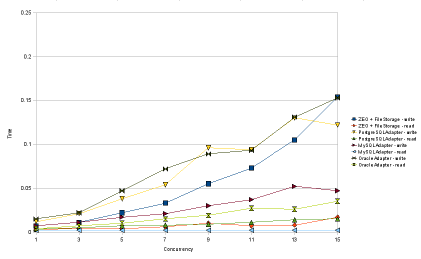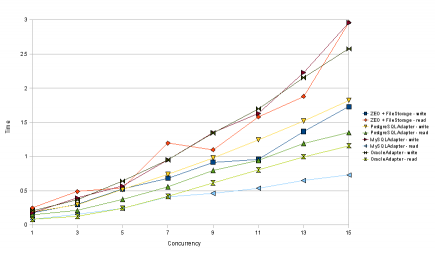I have just released two versions of RelStorage. Version 1.3.0b1 adds full support for ZODB blobs stored on the filesystem. Version 1.2.0 is currently the better choice if you’re upgrading a production system and don’t need blob support.
People have been asking for blob support for months. I am glad to finally get it done, with a little help from a customer. With blob support, now we can easily store large artifacts on the filesystem, while keeping all metadata in the database.
To celebrate the new release, I have created a sample buildout.cfg that builds Plone with RelStorage, PostgreSQL, and blob support. (Thanks goes to Hanno Schlichting, who released a compatible version of plone.recipe.zope2instance only moments after I requested it.) Here it is:
[buildout]
parts = plone zope2 instance zopepy
find-links =
http://dist.plone.org
http://download.zope.org/ppix/
http://download.zope.org/distribution/
http://effbot.org/downloads
http://packages.willowrise.org
eggs =
elementtree
PILwoTk
RelStorage
psycopg2
versions = versions
[versions]
ZODB3 = 3.8.3-polling
RelStorage = 1.3.0b1
[plone]
recipe = plone.recipe.plone
[zope2]
recipe = plone.recipe.zope2install
url = ${plone:zope2-url}
[instance]
recipe = plone.recipe.zope2instance
zope2-location = ${zope2:location}
user = admin:admin
products = ${plone:products}
eggs =
${buildout:eggs}
${plone:eggs}
plone.app.blob
zcml = plone.app.blob
rel-storage =
type postgresql
dsn dbname='plone' user='plone' host='localhost' password='plone'
blob-dir var/blobs
[zopepy]
recipe = zc.recipe.egg
eggs = ${instance:eggs}
interpreter = zopepy
extra-paths = ${instance:zope2-location}/lib/python
scripts = zopepy zodbconvert
P.S. I have been told that a very prominent Plone developer recently configured RelStorage with master/slave replication on MySQL, and that it works smoothly. I expect him to announce his success soon!

